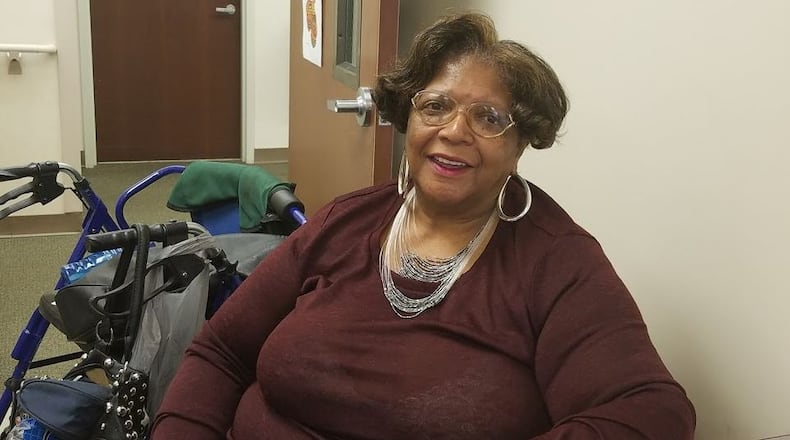In car-dependent metro Atlanta, demand for services to take older residents who cannot drive to doctors, grocery stores and senior centers already outpaces the availability.
Local counties put millions of dollars toward helping senior citizens get around, but as the aging population grows — it is expected to more than double over the next two decades — leaders are vexed about how to manage even more need.
In Fulton County, no more names are being added to the 1,800-person wait list for senior transportation services because no one came off it in 2016.
“We’re pretty much serving at capacity,” said Kenn Vanhoose, the division manager for Fulton County’s Office of Aging. “We haven’t added clients in quite some time.”
After having waits that lasted a decade, Gwinnett County added capacity to its senior transportation. Even that didn’t eliminate the problem, and a new wait list is now 39 people long.
Across metro Atlanta, senior transportation is a growing issue, said Mary Blumberg, the program manager for strategic planning and development for Aging and Health Resources at the Atlanta Regional Commission.
“We know the need exceeds the supply,” she said. “It’s our number one requested unmet need, no matter how you survey it.”
In the five-county metro Atlanta area, the population age 65 and up is expected to grow to 937,000 people in 2040, from 371,000 in 2015, according to the Atlanta Regional Commission.
As people age, and their eyesight and reflexes diminish, they can also lose their range of motion and the ability to look over their shoulder to check blind spots. Diseases like diabetes can affect their ability to feel the gas or brake pedals. All told, Blumberg said, people on average outlive their ability to drive by seven to 10 years.
And in metro Atlanta, access to public transportation is often limited. Blumberg said 90 percent of seniors over the age of 65 have poor access to public transportation.
Atlanta residents last year approved an expansion of MARTA, and other areas are talking about improving public transit. But even more access will not be enough to ensure all aging residents can get to where they need to go.
“It’s going to be a challenge forever,” said Todd Long, Fulton County’s chief operating officer. “For us, we need to identify what are our under-served communities. Our role is not to serve every senior. We can never do that.”
Fulton is increasing its senior transportation budget 28 percent, to $5.9 million. That won’t get them any new services, though — it will only cover cost increases to move seniors around. Cobb County spends $1.16 million a year to give rides to seniors and disabled residents. In Gwinnett, it’s $1.18 million.
“People need more transportation than we can provide them,” said Jamie Cramer, the director of Gwinnett County’s senior services. “The sheer volume is a problem.”
As costs and demand both rise, leaders across the metro area are trying unique services to help expand access to transportation for seniors.
In Cobb, donations help pay for discounted rides using private services, said Jessica Gill, the executive director of Cobb's senior services. A nonprofit called Common Courtesy Rides helps broker rides for seniors with ride-sharing services like Uber and Lyft, and the county's senior citizens council has negotiated a discounted rate with those services for short trips.
Some residents are able to buy discount vouchers that can help pay for the cost of rides with private taxi companies, Gill said, though the riders must negotiate their own rates. The county-provided services such as shuttle buses to senior centers are free of charge for residents.
Gwinnett also offers vouchers to residents, and some volunteers have offered to drive seniors around as they need it. Fulton is piloting a program with ride-sharing companies in the hopes of reducing the cost of trips in order to serve more people.
Like other areas, Cobb is “scratching the surface” of residents’ needs, Gill said — only 493 people use county-provided senior transportation. Including mobility services, it’s fewer than 700 people.
“It’s a small percentage of the population, and we take them everywhere,” Gill said. “We’re under-serving the population. …Transportation for all should be the goal.”
Having access to transportation is about more than filling the refrigerator or making it to a check-up. Being isolated through lack of transportation “can really drive your health into the ground pretty quickly,” Blumberg said.
“It’s important for people to be out, to be able to do activities, daily living, visiting friends,” she said. “We take it for granted, but when your health deteriorates, depression sets in.”
Joyce Wideman can attest to that. Wideman, 69, stopped driving around the same time her husband died, in 2010, after a form of arthritis caused her legs to go numb. Depressed and unable to drive, she hardly left her Atlanta home.
“I would just cry,” she said.
The vagaries of aging means that the friends Wideman would have called for rides in the past are also stuck. They too are growing older, are having surgery on their eyes and legs, and are reluctant to drive, Wideman said.
So access to the Fulton County senior centers on county transportation has been life-changing for her. In her building, she said, there are about six residents who want to come with her, but are still on the wait list and don’t have access to transportation to come on their own.
“When you sit in your apartment and you look at those walls all day long, it slows you down,” Wideman said. “It’s so good to get out and talk to people. It made a great difference.”
As people age in place, Cramer said, they often don’t know what their transportation needs are going to be. And though medicine has focused on extending people’s lives, the infrastructure to support that hasn’t caught up, Blumberg said.
Wideman said she would like to see more buses, to help give more people access to services. But even that wouldn’t be enough.
“Because there’s such a big demand, we can never satisfy it,” Long said. “We could put four times as much money to it and it might not matter.”
About the Author
Keep Reading
The Latest
Featured



